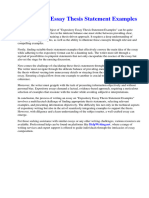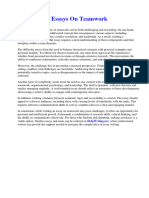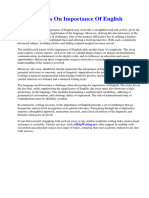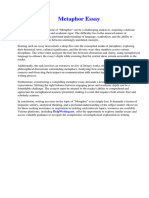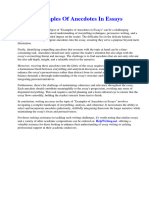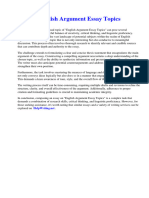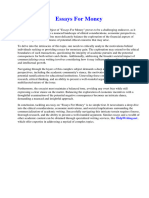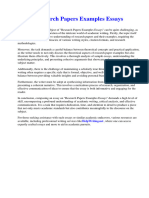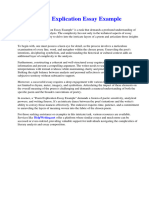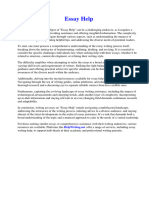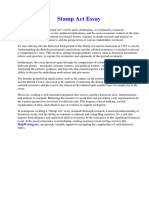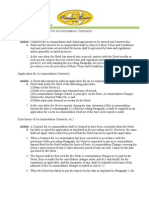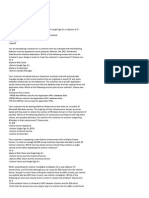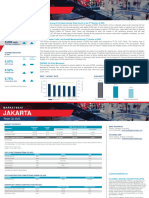A Process Essay
A Process Essay
Uploaded by
afibooxdjvvtdnCopyright:
Available Formats
A Process Essay
A Process Essay
Uploaded by
afibooxdjvvtdnOriginal Description:
Copyright
Available Formats
Share this document
Did you find this document useful?
Is this content inappropriate?
Copyright:
Available Formats
A Process Essay
A Process Essay
Uploaded by
afibooxdjvvtdnCopyright:
Available Formats
A Process Essay
Writing an essay on the topic of "A Process Essay" presents a unique challenge due to its inherent
meta nature. The task essentially requires crafting an essay about writing an essay, which demands a
deep understanding of the essay writing process itself.
Firstly, one must grapple with the conceptual intricacies of defining and elucidating the steps
involved in essay composition. This involves breaking down the process into manageable
components, such as brainstorming, outlining, drafting, revising, and editing. Each of these steps
necessitates careful consideration and explanation to ensure clarity and coherence in the essay.
Secondly, there's the challenge of striking a balance between providing detailed guidance on the
essay writing process and maintaining the engagement of the reader. The essay should not only
inform but also captivate its audience, which requires adept storytelling and effective use of language
to keep the reader invested from start to finish.
Moreover, crafting a process essay on writing itself requires a certain level of self-awareness and
reflexivity. The writer must navigate the complexities of introspection, reflecting on their own
writing process, habits, and challenges. This introspective aspect adds another layer of complexity to
the essay, as it demands honesty and vulnerability in examining one's own writing journey.
Furthermore, there's the challenge of addressing a potentially diverse audience with varying levels of
familiarity and expertise in essay writing. The essay must cater to both novice writers seeking
guidance and more experienced writers looking for insights to refine their craft. This necessitates a
nuanced approach in explaining concepts and offering tips that are accessible yet insightful for
readers across different skill levels.
In conclusion, crafting an essay on the topic of "A Process Essay" is undoubtedly a formidable task
that requires navigating through layers of complexity. From conceptualizing the essay's structure to
maintaining reader engagement and addressing a diverse audience, the process demands careful
thought, introspection, and skillful execution.
Similar essays and much more can be ordered on HelpWriting.net .
A Process Essay A Process Essay
Gay Bisexuals In The Broadway Theatre
Bilitis and other homophile groups, were ultimately failed in their attempts to encourage
the acceptance of homosexuals by society. Later, they have realized that the gays and
lesbians were not alone. The broadway theater seems to be the greatest center for the
LBGT. Unfortunately, the Broadway seems to be degenerating these days when it comes
to presenting shading portrayals by the Lesbians GayBisexual and Transgendercharacters
on the stage.
In addition, the transgender character of Mary Sunshine and the bisexual partner in
Cell Block Tango were played for laughs. The New York Times described the first Date
s gay best friend character as a noxious stereotype. The gay characters in the Book of
Mormon are depicted as entertaining
8 Principles Of Total Quality Management
Chapter 11: Total Quality Management and Quality Teams
1.0Introduction
Total Quality Management (TQM) is a management approach that originated in the
1950s and has steadily become more popular since the early 1980s. Total quality
management (TQM) is said as a management which approach to long term success with
customer satisfaction. In this effort, all members of an organization participate in
improving processes, products, services, and the culture in which they work. The TQM
also can be said as continuous improvement so the continuous improvement is based on a
Japanese Concept called Kaizen, is the philosophy of continually seeking ways to
improve operations. It invloves identifying benchmarks of excellent practices and
instilling a sense of employee ownership of the process. Total Quality Management,
TQM, is a ... Show more content on Helpwriting.net ...
Some of the companies who have implemented TQM include Ford Motor Company,
Phillips Semiconductor, SGL Carbon, Motorola and Toyota Motor Company. The 8
principles of total quality management are such as Customer focused which customer
ultimately determines the level of quality. Secondly is total employee involvement is
which All employees participate in working toward common goals. Thirdly Is Process
centered. A process is a series of steps that take inputs from suppliers (internal or external)
and transforms them into outputs that are delivered to customers. Next is Integrated
system an organization may consist of many different functional specialties often
organized into vertically structured departments, it is the horizontal processes
interconnecting these functions that are the focus of TQM. Next principle is Strategic
and systematic approach is a critical part of the management of quality is the strategic
and systematic approach to achieving an organization s vision, mission, and goals. This
process, called strategic planning or strategic management, includes
You might also like
- How To Make An Outline For A Narrative Essay100% (2)How To Make An Outline For A Narrative Essay5 pages
- Should Cellphones Be Allowed in School Persuasive Essay100% (1)Should Cellphones Be Allowed in School Persuasive Essay7 pages
- Terms and Conditions For Accomodation ContractsNo ratings yetTerms and Conditions For Accomodation Contracts6 pages
- Meeting Schedule & WTA Schedule On Safety & QualityNo ratings yetMeeting Schedule & WTA Schedule On Safety & Quality2 pages
- SOLID Architecture Principles Using Simple C# ExamplesNo ratings yetSOLID Architecture Principles Using Simple C# Examples14 pages
- VCenter Management 5 5 VTSP Test Questions Answers50% (2)VCenter Management 5 5 VTSP Test Questions Answers4 pages
- UGC-CARE List of Journals For MultidisciplinaryNo ratings yetUGC-CARE List of Journals For Multidisciplinary3 pages
- Simulation of Wind Turbine Speed Control by MATLAB: January 2010No ratings yetSimulation of Wind Turbine Speed Control by MATLAB: January 20105 pages
- Amorsolo, Fernando C. 1949 Oil On CanvasNo ratings yetAmorsolo, Fernando C. 1949 Oil On Canvas1 page
- Bangabandhu Sheikh Mujibur Rahman Science and Technology UniversityNo ratings yetBangabandhu Sheikh Mujibur Rahman Science and Technology University3 pages
- Politics and International Relations - BA (Hons) - UWE Bristol: CoursesNo ratings yetPolitics and International Relations - BA (Hons) - UWE Bristol: Courses17 pages




